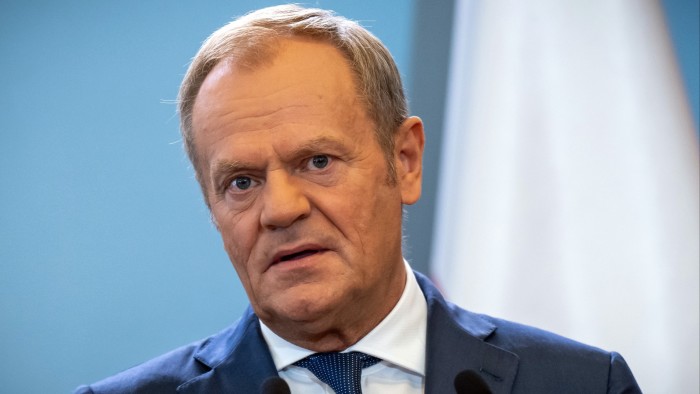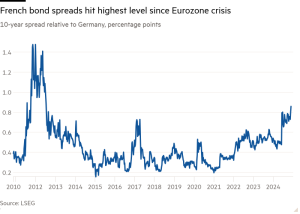Donald Tusk calls for naval patrols in Baltic Sea to counter Russian sabotage

Unlock the Editor’s Digest for free
Roula Khalaf, Editor of the FT, selects her favourite stories in this weekly newsletter.
Poland is pushing Nordic and Baltic states to patrol their waters jointly against any Russian sabotage attempts, following the suspicious severing of two data cables last week.
Polish Prime Minister Donald Tusk said on Wednesday he was seeking to convince Baltic Sea countries that they share “the same sense of threat when it comes to Russia” to set up a “navy policing” force that would mirror Nato’s Baltic air patrols.
His comments came as he arrived in Sweden for a summit of Nordic and Baltic leaders who were set to discuss the security challenges stemming from two incidents last week in which two fibre optic cables connecting Germany and Finland, as well as Sweden and Lithuania, were severed within 24 hours.
Yi Peng 3, a Chinese bulk carrier, is being investigated by Swedish authorities after it passed close to both cables around the time they were cut more than a week ago. The ship is now voluntarily moored in international waters between Denmark and Sweden, with naval vessels from both countries as well as Germany, and occasionally Russia, monitoring the area.
Europe is on heightened alert for potential sabotage of crucial infrastructure after a series of events including damaged gas pipelines, data cables, parcel bombs and arson attacks across the continent.
Intelligence officials have focused their suspicion on Russia for many of the incidents. But for the second time in just over a year, a Chinese vessel is suspected of damaging infrastructure in the Baltic Sea, sparking intense diplomatic efforts with Beijing.
Germany’s defence minister Boris Pistorius has not explicitly blamed Russia, but he linked the cable damage to the kind of “hybrid” warfare that the Kremlin has sponsored to attack western allies of Ukraine.
On Wednesday Tusk also called on European partners to “wake up” and act more decisively against Russia without waiting for Washington to make decisions first.
“We are unable to predict how American policy will evolve in the coming months — of course we must cultivate relations with the United States, but Europe must become independent. The era of fear and uncertainty towards Russia must end,” he said.
EU allies have expressed concern that Donald Trump’s return to the White House in January will lead to less US involvement in European security and add pressure on Nato allies to spend more on defence or be left at Russia’s mercy.
Tusk’s pro-EU coalition government plans to make security and defence the core of its six-month rotating presidency of the bloc which starts in January.
If Europe stands united, then “Russia is a technological, financial and economic dwarf in relation to Europe,” Tusk said. “If Europe is divided, Russia is a threat to each individual state.”
The Polish foreign ministry has recently warned that it could expel more Russian diplomats after accusing some of them of plotting arson attacks in Poland. Last month Warsaw ordered the closure of the Russian consulate in the Western city of Poznań.
Polish investigators have also linked Russia to the recent discovery of parcel bombs in Germany and the UK, which could have been delivered onwards by courier companies to the US.
#Donald #Tusk #calls #naval #patrols #Baltic #Sea #counter #Russian #sabotage






